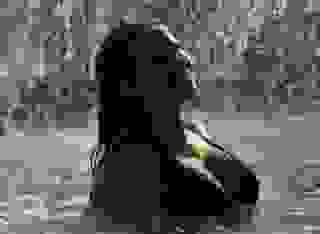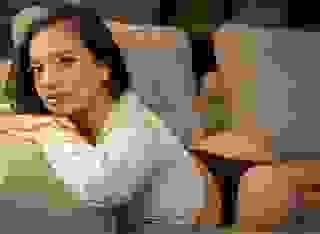- Non-Erotic
- Uncertain Justice
- Page 18
Note: You can change font size, font face, and turn on dark mode by clicking the "A" icon tab in the Story Info Box.
You can temporarily switch back to a Classic Literotica® experience during our ongoing public Beta testing. Please consider leaving feedback on issues you experience or suggest improvements.
Click hereGame trail or Indian byway, it followed the easiest contours of the terrain as it wound through the hills and brush covered ravines, climbing high only to descend again. He hadn't seen any of the tiny brooks that usually crisscrossed the mountain slopes and the lack of water began to concern him.
At the foot of a tall, mesa, the trail dropped into a canyon that quickly narrowed until he was walking between sheer walls only three or four yards apart. Rushing water eons ago had carved the soft rock into strange, intricate patterns as high as he could see on both walls. He walked in deep shadows that provided a welcome break from the sun.
In a hidden alcove a few steps down a side canyon, he found faded pictographs whose significance he couldn't begin to understand. Wonderingly, he swept his hand a few inches away from the rock along the ancient symbols. Long dead men had worked to leave a message for those who followed. He wondered what the message had been and why it had been left in such a remote place.
§
By mid-afternoon, the sun was bearing down hard. The pale colored rock walls of the canyon trapped the sunlight and reflected palpable waves of heat back and forth between them. The trail began to climb the right wall. Sometimes it rose sharply, but in most places the incline was slight. A strengthening breeze began to touch him but the oven-like heat quickly overcame its cooling effect. He trudged on, gulping water whenever he could take a break on the irregular surface.
The bottom of the cut gradually fell away until the trail clung high on the wall in the bright sun. The opposite side of the gorge was more than a hundred yards now. Half a mile later, the rock shelf was almost level--gentle up slopes were countered by declines. He'd seen no sign of water since early this morning. Pebbles, loosened by the expansion of the rock in the heat rattled down the steep walls at intervals. Once he had been forced to huddle against the canyon wall as a larger stone rebounded off a change bulge in the rock face to fall past him.
Then the ledge almost disappeared. Without stopping to think of the danger, he pressed on, crowding close against the rock wall until his right shoulder scrapped the rough stone. Moments later, he was walking with his right arm held tight against his belly and his body twisted to the left to give his shoulder more room.
The rock shelf became so narrow he had to face the rock wall and sidestep along the path. In moments, his heels were hanging over the edge as he moved slowly along the path. Sliding his feet along the slender width of the shelf raised a cloud of dust that billowed about him before falling away into the depths.
The hiking stick he'd whittled from a tree branch last week became too cumbersome; the hand carrying it was better utilized clamped tight to protuberances and thrust inside cracks on the rock face to keep him from falling. He released the slender pole and listened as it clattered down the nearly sheer wall to the bottom. The underbrush down there swallowed it soundlessly.
After an eternity, he came to a section where the ledge widened. Soon it was a full yard across. Putting his back to the cliff, he leaned against the rock until the trembling in his legs eased. He wiped the sweat off his face and tucked the bandanna away. If he stopped for too long, he would have trouble with stiffening muscles. Taking a deep breath, he forced himself into motion again. Occasionally he stumbled on irregularities in the rock. He was tiring fast and there was nowhere to rest.
The ledge widened and narrowed again as dictated by the whims of erosion. In places, eighteen-wheelers could have driven three abreast; at other points, it narrowed to a shoulder's width across but it had never contracted again to no more than a slender foothold ... until now.
He stopped to drink some water while he studied a gap where the ledge on which he was walking had collapsed into the canyon. At least four feet across, he would have to take a running jump to continue along the trail. If he missed his landing ... well, it was a long way down to the bottom of the canyon. For a moment, he was tempted to turn around, but he hated to admit defeat.
Nerving himself, he backed a few feet along the trail and lumbered forward to jump the expanse of open space. He surprised himself by clearing the edge by a good three feet. His heart remained in his throat for some time while his hands clutched at handholds in the rock to steady himself.
Looking over the edge, he shuddered as he contemplated the drop to the bottom of the gorge. He wiped his face with a bandanna that was getting a great deal of use today. Apart from the distance down the steep rock face, it was choked with rounded boulders and jagged rocks dumped there by rampaging waters in ages long past. In places, sparse underbrush found a precarious hold in the rocky soil but the spindly bushes only emphasized the desolation. Traveling in either direction would be impossible if he was trapped down there--assuming he survived the fall.
Shaking the canteen, he guessed he had a little less than half a canteen of water left ... about a liter ... plus the one-liter spare canteen lashed to the side of the pack. That was all the water he had left. He frowned. There was no doubt he could reverse his direction of travel and be back at the creek where he'd spent last night long before he began to suffer from lack of water but he didn't want to do that.
Deciding against another mouthful of water, he stowed the canteen away and stood for a long moment listening to the sounds of the sun-baked canyon. Cocking his head, he thought he heard running water somewhere ahead. The tantalizing sound faded ... returned ... and faded again. Miles shook his head in annoyance as it dwindled and died. There was only the breeze as it swept through the canyon.
He loosened the straps he'd tightened to jump the gap. Stepping carefully along the narrow ledge, he marched on.
Behind him, the wind brushed at his footprints until there was no sign anyone had ever passed this way.
§
Senator Jenkins tapped on the wood surface in front of him with a gavel big enough to pound stakes into the ground to secure a circus tent. The chairman of the Judiciary Committee repeated the tap four more times, each one a little louder than the last, until he judged the chamber was quiet enough for him to be heard without raising his voice.
He glanced to each side to see how many Committee members were in their seats at the huge semicircular desk and glowered at several late arrivers.
Centered in the well before the Senator, the nominee was carefully arranging a series of folders and loose documents on the table in front of him. A pencil was nudged into perfect alignment along the top of a notepad and Mr. Brady looked up expectantly.
"Let the record show," he began, "the Senate has received a request from the President to expedite the matter of Mr. Carl Brady's nomination to fill the post of Deputy Attorney General of the United States." He paused a moment to make sure there would be a clear gap, suitable for editing on the evening news broadcasts, before concluding.
"We are pleased to respond so quickly to our President's appeal in this matter." The message wasn't so much for the television audience as it was to fellow politicians inside the Beltway. Specifically, it was clear notice to the White House that they now owed a big favor to the senior Senator from New Hampshire and he would collect someday.
Carl Brady waited patiently with two advisors recommended by his long-time friend. The President had brought Carl into the Oval Office specifically to introduce him to the short black man on Carl's right and the cadaverous looking Hispanic on his left.
They were owed favors too, and Brady knew he would be expected to hire the pair as aides once he assumed office. He indulged himself in a bit of speculation about where they might fit into his staff.
"Mr. Brady, I understand you have a statement you would like to read into the record. You may begin now, if you're ready, sir." Brady jerked his attention back to the Committee meeting and tried to respond. Caught by surprise, the stab of pain from his still healing neck wound strangled his reply and he could manage only an abbreviated squeak. He put his hand to his throat.
"Yes, Mr. Chairman," he finally grated. He massaged his neck and swallowed hard, eliciting more than a few sympathetic noises from the throng of reporters and the small audience behind him.
"Mr. Chairman, as a victim of a particularly violent crime myself, I bring to the office of Deputy Attorney General a definitive insight into the plight of victims nationwide and a firm resolve to seek out the perpetrators of these acts whenever and wherever they can be found. Federal Bureau of Investigation statistics show that crimes against persons is at an all time high in this nation and it's time...."
Brady continued speaking for several minutes before his still-tender vocal cords failed him and he turned over the reading of his statement to his new aide ... the short one. Brady sat back in his chair and watched the effect on the panel of Senators, wondering how the vote would go. He relaxed. Most of the Senators were directing sympathetic glances in his direction and making sure to catch his eye.
In the end, there were remarkably few questions asked of him ... presumably in deference to his injury ... and the vote to confirm him was overwhelming. In fact, only the conservative Senator from Texas voted against the confirmation, prompting some in the gallery to wonder if he knew something about Brady that the others didn't. Newspaper reporters assumed it was something else, condemning the Senator for mounting a personal vendetta and accused him of partisan politics.
The next Monday morning, before most of the employees had made their way into the building, Deputy Attorney General Carl Brady made his first appearance in the hallways of the Department of Justice accompanied by the short black man who Brady had decided would be his chief aide. The other man recommended by the President was too tall. Brady didn't like being around people taller than himself.
§
The ledge supporting the trail leveled out after having climbed more than a thousand feet in what he guessed was a little less than three miles. The bottom of the gorge, having earlier dropped precipitously away from the ledge, was now only a short distance below him as he shuffled tiredly down the trail. The tumbled rocks and tangled brush down there had given way to dust, sand, and the cracked remains of fallen rocks.
The sides of the gorge had closed in again until the gap was more a split in the rock than a canyon. When he craned his head back to look straight up, he could barely see a strip of blue sky that wasn't obliterated by vertical walls of stone that seemed to lean inward. He was shielded from the harsh sun though; it had traveled too far west to shine into the narrow slit. He reveled in the comparative coolness.
The bottom of the chasm rose imperceptibly as he walked until the ledge was no more. He found himself slogging along at the bottom of a deep canyon, scrambling over the occasional boulder and shuffling through deep dust and sand.
He worried about his ability to retrace his steps up the trail but there really wasn't any portion of the trail couldn't get through if he had to. On top of that....there was that maddening sound of running water. He had to find out what that was. He pressed on.
Abruptly he was bathed in bright sunshine. In the dazzling light, he could see a distant snow topped mountain framed by the walls of the cut. He cheered soundlessly; his throat was too dry to give voice to his relief. With any luck at all, he was near the end of the passage. The sun faded as he walked until he was in a welcome shade once more.
The sun came from behind a cloud and he stumbled to a halt as the brightness blinded him. The canyon through which he'd been traveling had broadened so abruptly he might have stepped from a narrow corridor into a concert hall. Lowering his head, he rubbed tightly shut eyes until the white-hot spots faded. He pulled the brim of his hat lower on his forehead and opened his eyes cautiously. His left hand rose as a shield from the bright rays.
There were tall cliffs to his right and a mountain rose on his left with a river and pristine meadows between them. Everything clamored for attention in a kaleidoscope of colors and shapes he couldn't immediately absorb. As he squinted, the panorama gradually came into focus. He was looking along the length of a valley, right into the face of the late afternoon sun.
The canyon through which he'd been traveling was a narrow cut in what had been the northeastern corner of a gigantic flat-topped mesa that had been part of the Colorado plateau in primeval times. Very soon, scarcely more than three million years, the fragment split off from the mesa would be ground away by the elements.
A river flowing north from high mountains had worn away the southeastern portion of the mesa eons ago but had been forced to turn east when balked by solid granite deeper in the mesa's guts. The prehistoric river worked at the more pliable rock formations nearby and became wider. As the climate warmed, deep glaciers began to melt. The river deepened and ran faster as it rose on the mesa's wall. In time, it found a softer layer of rock and abandoned its eastward channel. The roiling waters gouged a passage north through the rest of the mesa until connecting with a tributary that disgorged itself into the vast inland sea covering much of Nebraska and regions to the south.
As the flow increased to its maximum at the very end of the ice age, the river widened further and ate away more of the mesa. A small valley developed between the mesa and the range of new mountains born of extinct volcanoes to the east. Silt began to settle at the bottom of the stream. As the glaciers receded, the level of the river fell until it no longer reached the cleft in the mesa and the current resumed its easterly course at the point where it had earlier boiled through the narrow channel. In modern times, with the river fed only by melting snow and the meager remnants of glaciers in the high mountains, it became a tamer stream meandering through a valley of its own making.
Miles had hiked through the remains of the cut through the mesa whose granite heart was exposed in layers as clearly defined as in the Grand Canyon. After walking from mid-morning through late afternoon, he'd come to the open valley on the mesa's southeastern perimeter.
The valley was absolutely beautiful. Small, enclosed by elevations all around, but beautiful.
The mesa loomed hundreds of feet above him to his right front and behind him. To his left front lay the valley, flat as a billiard table, and lush and inviting in the sun. To his left, a mountain ridge running north and south formed a boundary a few miles to the east. On this side of the valley a river glinted in the sun. It ran close to the mesa's sheer cliffs, changing course to the east virtually at his feet.
Beyond a small field of jumbled boulders of all sizes in front of him was a small triangular field of grass and trees bounded on the north and west by the vertical walls of the mesa and on the south and east by the river.
With nowhere else to go, he passed through the boulders and walked slowly into the small park. The deep grass cushioned his steps as he marched beside the stream--something he appreciated after the hours just passed of walking on the unforgiving rock surface of the canyon trail.
The river was thirty-five or forty feet across, the water only five or six feet deep over a rocky bed where he stood but he could see a sandy bottom just ahead at a bend that disappeared around a point of the cliff that stood at his right hand. As a barrier between the tiny pasture on this side and the much larger expanse of grass and trees on the other, the stream wasn't much, but it looked like it would be a good source of food. The silvery flashes of large trout were everywhere.
The high ridge rising precipitously on the eastern boundary of the valley had its long axis running down to the southwest. Seeming to spring from the valley floor itself, the mountain's lower slopes were huge talus fields where millennia of tumbling rocks had landed. Above the scree, vertical cliffs alternated with marginally less steep inclines that angled upward from north to south. As he watched, a dust cloud announced a new rockslide rattling down to add to the mass of debris at the base.
On the far end, Miles could see a distinctively shaped peak of solid granite towering into the sky. Rising from a sixty-degree slope, the peak was perpendicular for hundreds of feet--its four sides forming a neat rectangle whose sides vaguely faced the four major points of the compass. An irregular pyramid topped the rectangle, rising to an impossibly sharp point thousands of feet above the valley floor.
Shading his eyes with his outstretched palm, he could see more mountains to the south and west. They were cloaked in gathering clouds that promised the usual Rocky Mountain afternoon showers would arrive soon. As he watched, a hazy curtain of rain began marching through the distant peaks toward him.
He began to walk southwest along the river. His head was on a swivel as he tried to take in everything at once. The fish in the stream were much larger than the small brook and rainbow trout he'd caught and eaten for the past few weeks. Half seen flashes in dark pools near the bank hinted at even bigger ones waiting for a hungry man to catch. His mouth watered. He was ready for fish again after too many days of nothing but venison.
The meadow grass appeared to have been trampled in places and several areas had been cropped short by grazing animals. Shading his eyes, Miles could see a small herd of deer or elk across the stream, unconcernedly making their way between two clumps of trees but there were none in sight on this side.
He stopped short at a rustle in the brush not too far from his feet. Not sure what he'd found, Miles' right hand slapped the butt of the pistol holstered across his belly. He grimaced as a long-eared rabbit skipped into view. He let out the breath he hadn't been aware he was holding and let his hand drop away from the weapon. The rabbit stopped and watched Miles calmly as it munched a bit of greenery.
"Not afraid of me, are ya?" Miles mused aloud. "That, sir ... or madam ... will change soon," he promised. The fish in the stream and an occasional rabbit would be a nice change from the deer meat he had been eating almost exclusively for the past week. He waved good-bye to the bundle of fur and pressed on, finally startling the animal. The rabbit dove back into the brush from which he'd emerged.
Now that he was closer, he could see the river was an abrupt three or four feet drop from the top of its banks. The rich clay supported a heavy growth of grass in the meadow that ran right to the edge of the river but the layer of soil was comparatively shallow. Beneath the dark soil was a clear base of hard rock. There was little in the way of a beach beside the stream. Trees, old and young, were scattered haphazardly here and there.
He wandered south along the river, watching the water more than his path. Here the channel paralleled the mesa towering high into the western sky. A few hundred yards ahead the cliff came close to the water's edge. The current was moving at a fair clip; quick enough that there were ripples and eddies in the lee of several big rocks.
He was uneasy confined in this small corner of the valley. There was an unclimbable cliff to his right ... a sheer wall from which couch-sized boulders crashed down from time to time. There were a number of them scattered around--most of them tight against the sheer wall but others had rolled a good distance away. A few had made it as far as the river and force the stream to flow around them. Many were half buried in the ground but others were from more recent falls.








